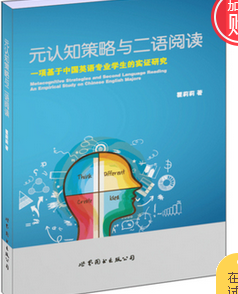 [内容推荐]
[内容推荐] 本书以元认知策略与二语阅读的关系为视角,探究中国英语专业学生的阅读元认知策略使用现状以及元认知策略对其英语阅读的潜在作用。在理论方面,本书通过阅读元认知策略研究模式的构建以及研究方法的创新为该研究领域的理论发展提供有价值的信息;在实践方面,本书的主要研究结果,例如元认知策略对于培养自主的二语阅读者的作用、高水平阅读者的策略使用偏好、将元认知策略培训融入常规语言教学的必要性及途径,将为二语阅读教学提供有益启示。
[目录]
Chapter 1 Introduction 1
1.1 Statement of the problem 1
1.2 Objectives of the study 3
1.3 Significance of the Study 4
1.4 Outline of the study 6
Chapter 2 Literature Review 8
2.1 Introduction 8
2.2 Second language reading 8
2.2.1 The nature of reading 9
2.2.1.1 Purposes for reading 9
2.2.1.2 Models of Reading 10
2.2.2 Issues in L2 reading 13
2.2.2.1 Language proficiency and L2 reading 13
2.2.2.2 Amount of exposure to L2 reading 13
2.2.2.3 Motivations for L2 reading 14
2.2.2.4 L2 reading instruction 14
2.3 Metacognition 15
2.3.1 Metacogntition vs. cognition 16
2.3.2 Metacognitive knowledge 16
2.3.3 Metacognitive strategies 18
2.4 Metacognition and L2 reading comprehension 20
2.5 Metacognition and self-regulated reading 21
2.6 Metacognitive strategy training in reading 23
2.6.1 Studies on metacognitive strategy training in reading 24
2.6.2 Strategy training models 26
2.7 Summary of the chapter 28
Chapter 3 Research Design 29
3.1 Introduction 29
3.2 Research design of the descriptive study 29
3.2.1 Questionnaire survey 30
3.2.1.1 Subjects 30
3.2.1.2 Questionnaire construction 31
3.2.1.3 Data collection and analysis 35
3.2.2 Think-aloud Protocol 36
3.2.2.1 Objectives 36
3.2.2.2 Subjects 36
3.2.2.3 Instruments 37
3.2.2.4 Procedure of think-aloud protocol 38
3.2.2.5 Data collection and analysis 39
3.3 Research design of the quasi-experimental study 42
3.3.1 Objectives 42
3.3.2 The pilot study 43
3.3.2.1 Procedure of the pilot study 43
3.3.2.2 Results of the pilot study 43
3.3.2.3 Noteworthy points for the strategy instruction 46
3.3.3 Strategy instruction in the reading classroom 48
3.3.3.1 Background of the reading course 50
3.3.3.2 Instruction procedure 51
3.3.3.3 Data collection and analysis 57
3.4 Summary of the chapter 63
Chapter 4 Results and Discussions of the Descriptive Study (1): Questionnaire Survey 64
4.1 Introduction 64
4.2 Overall pattern of the use of metacognitive strategies 64
4.3 Inter-group differences in the use of metacognitive strategies 67
4.4 Most and least frequently used individual strategies 73
4.5 Correlation between strategy use and reading proficiency 74
4.6 Summary of the chapter 75
Chapter 5 Results and Discussions of the Descriptive Study (2): Think-Aloud Protocol 77
5.1 Introduction 77
5.2 Two-level framework of metacognitive strategies 77
5.3 Differences between skilled and unskilled readers 81
5.3.1 Difference in metacognitive strategy uses 81
5.3.2 Difference in the orchestration of strategies 84
5.4 Reasons for different strategy uses 86
5.4.1 Language proficiency 86
5.4.2 Motivational factors in reading 87
5.4.3 Instructional factors 88
5.5 Correlation between strategy use and reading performance 89
5.5.1 Metacognitive strategies and reading performance 89
5.5.2 Comprehension monitoring strategies and reading performance 92
5.6 Summary of the chapter 95
Chapter 6 Results and Discussions of the Quasi-Experimental Study 98
6.1 Introduction 98
6.2 Effects of strategy training on metacognitive strategy use 98
6.3 Effects of the strategy training on reading performance 103
6.4 Effects of strategy training on self-regulated reading 105
6.4.1 Planning and self-regulated reading 106
6.4.2 Selective attention and self-regulated reading 117
6.4.3 Monitoring and self-regulated reading 121
6.4.4 Evaluation and self-regulated reading 125
6.5 Summary of the chapter 130
Chapter 7 Conclusion 131
7.1 Introduction 131
7.2 Major findings 131
7.2.1 Metacognitive strategies in EFL reading 131
7.2.2 Metacognitive strategies and comprehension monitoring strategies in reading comprehension 132
7.2.3 Metacognitive strategy training and metacognitive strategy use 134
7.2.4 Metacognitive strategy training and reading proficiency 134
7.2.5 Metacognitive strategy training and self-regulated reading 135
7.3 Implications of the study 136
7.3.1 Theoretical implications 136
7.3.2 Methodological implications 138
7.3.3 Pedagogical implications 139
7.4 Limitations of the study 142

 新书报道
新书报道